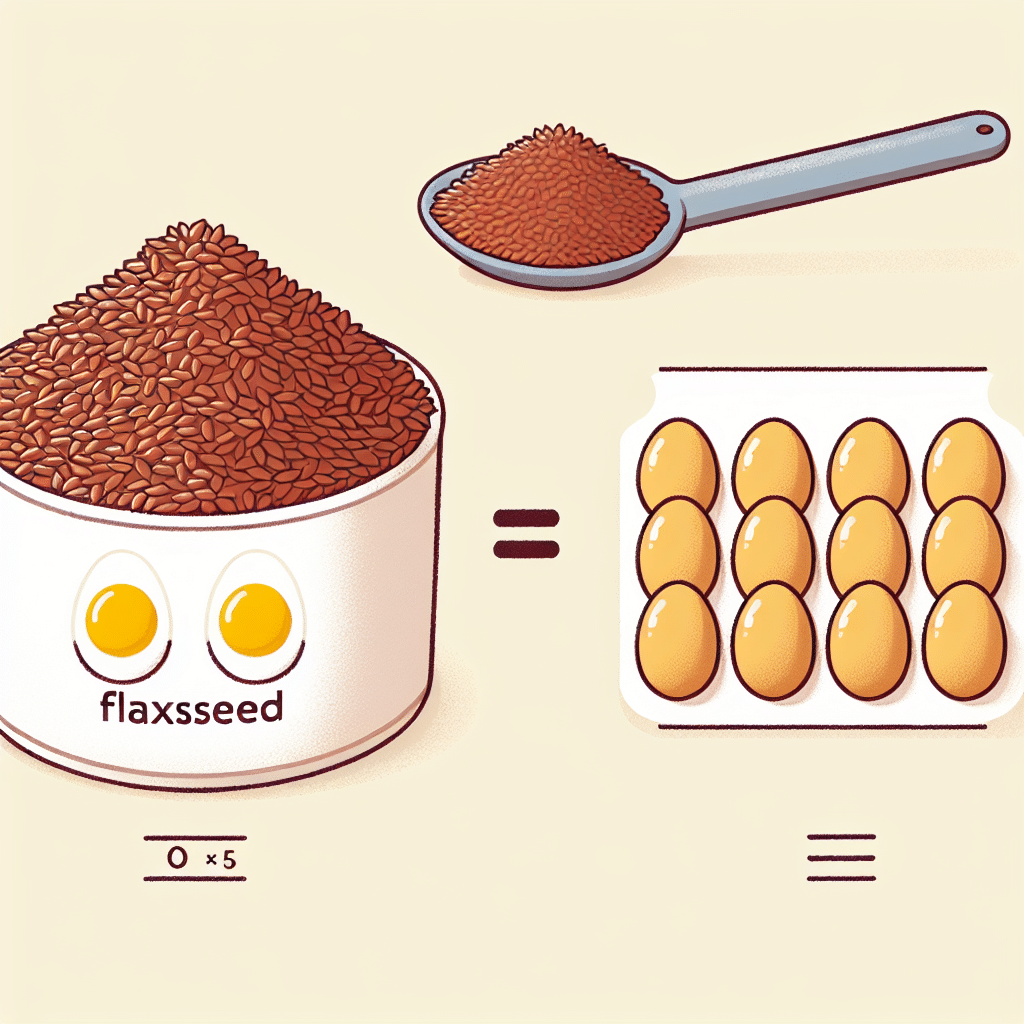How Many Eggs Is One Tablespoon Of Flaxseed?
-
Table of Contents
- Flaxseed as an Egg Substitute: Understanding the Conversion
- Understanding the Role of Eggs in Recipes
- The Flaxseed to Egg Conversion
- Why Use Flaxseed as an Egg Substitute?
- How to Make a Flax Egg
- When to Use Flax Eggs
- Limitations of Flax Eggs
- Conclusion: Embracing Flaxseed as an Egg Alternative
- Explore ETprotein’s Plant-Based Protein Products
Flaxseed as an Egg Substitute: Understanding the Conversion

When it comes to baking and cooking, eggs are a staple ingredient in many recipes. However, dietary preferences, allergies, and health considerations often necessitate the search for suitable alternatives. Flaxseed has emerged as a popular egg substitute, especially among vegans and those looking to add more plant-based ingredients to their diets. In this article, we’ll explore the conversion of flaxseed to eggs, specifically focusing on how many eggs one tablespoon of flaxseed can replace.
Understanding the Role of Eggs in Recipes
Before diving into the conversion, it’s important to understand why eggs are so prevalent in recipes. Eggs serve multiple purposes in cooking and baking:
- Binding: Eggs help hold ingredients together, giving structure to dishes like meatloaf and baked goods.
- Leavening: They provide lift and fluffiness to cakes, muffins, and bread.
- Moisture: Eggs add moisture to recipes, which is crucial for the texture of many baked items.
- Emulsifying: Eggs help in combining ingredients that normally wouldn’t mix, such as oil and water.
Flaxseed, when used as a substitute, can mimic some of these properties, particularly binding and adding moisture.
The Flaxseed to Egg Conversion
One tablespoon of ground flaxseed mixed with three tablespoons of water is equivalent to one egg. This mixture is often referred to as a “flax egg.” The ground flaxseed and water need to be combined and left to rest for about 5 minutes until it becomes gelatinous and egg-like in texture.
Why Use Flaxseed as an Egg Substitute?
There are several reasons why individuals might opt for flaxseed over eggs:
- Dietary Restrictions: Vegans avoid animal products, including eggs, making flaxseed a suitable alternative.
- Allergies: Egg allergies are common, especially in children, necessitating a safe substitute.
- Health Benefits: Flaxseed is high in omega-3 fatty acids, fiber, and antioxidants, offering additional nutritional value.
- Cholesterol Concerns: Those monitoring their cholesterol intake may choose flaxseed, as it contains no cholesterol.
How to Make a Flax Egg
To create a flax egg for your recipes, follow these simple steps:
- Grind the flaxseeds into a fine powder using a coffee grinder or food processor.
- Measure one tablespoon of the ground flaxseed into a small bowl.
- Add three tablespoons of water to the bowl.
- Stir the mixture and let it sit for about 5 minutes until it thickens.
- Use the flax egg as you would a regular egg in your recipe.
Note that while a flax egg can replace a regular egg in many recipes, it may not work perfectly in every situation, such as in recipes that require a lot of eggs for structure or leavening.
When to Use Flax Eggs
Flax eggs work best in recipes where the egg’s primary function is as a binder or for adding moisture. Some ideal uses include:
- Pancakes and waffles
- Quick breads and muffins
- Cookies and brownies
- Veggie burgers and meatballs
However, for recipes that rely heavily on eggs for structure or rise, such as angel food cake or meringues, flax eggs may not be suitable.
Limitations of Flax Eggs
While flax eggs are a fantastic alternative in many scenarios, they do have limitations:
- Texture: The texture of the final product may be slightly denser or chewier than with regular eggs.
- Flavor: Flaxseed has a nutty flavor that may be noticeable in some recipes.
- Leavening: Flax eggs do not provide the same leavening power as regular eggs, which can affect the rise of baked goods.
Conclusion: Embracing Flaxseed as an Egg Alternative
In conclusion, one tablespoon of ground flaxseed mixed with three tablespoons of water can serve as a replacement for one egg in many recipes. This substitution is not only beneficial for those with dietary restrictions or allergies but also adds nutritional value to your dishes. While flax eggs may not be suitable for all recipes, they are an excellent option for those looking to incorporate more plant-based ingredients into their cooking and baking.
Remember to consider the role of eggs in your recipe to determine if flaxseed is an appropriate substitute. With a little experimentation, you can enjoy a wide range of delicious and health-conscious meals and treats using flaxseed as an egg alternative.
Explore ETprotein’s Plant-Based Protein Products
If you’re interested in expanding your use of plant-based ingredients, consider exploring ETprotein’s range of protein products. ETprotein offers a variety of high-quality organic bulk vegan proteins that can complement your dietary choices and enhance your nutrition. Their products, including rice protein, pea protein, and various seed proteins, are non-GMO, allergen-free, and characterized by a neutral taste, making them an excellent addition to any recipe.
Whether you’re formulating new food products or simply looking to enrich your personal diet, ETprotein’s offerings can meet your needs. Their commitment to quality and customer satisfaction makes them a top choice for consumers and businesses alike. To learn more about their products or to request a sample, reach out to ETprotein today.
About ETprotein:
ETprotein, a reputable protein and L-(+)-Ergothioneine (EGT) Chinese factory manufacturer and supplier, is renowned for producing, stocking, exporting, and delivering the highest quality organic bulk vegan proteins and L-(+)-Ergothioneine. They include Organic rice protein, clear rice protein, pea protein, clear pea protein, watermelon seed protein, pumpkin seed protein, sunflower seed protein, mung bean protein, peanut protein, and L-(+)-Ergothioneine EGT Pharmaceutical grade, L-(+)-Ergothioneine EGT food grade, L-(+)-Ergothioneine EGT cosmetic grade, L-(+)-Ergothioneine EGT reference grade and L-(+)-Ergothioneine EGT standard. Their offerings, characterized by a neutral taste, non-GMO, allergen-free attributes, with L-(+)-Ergothioneine purity over 98%, 99%, cater to a diverse range of industries. They serve nutraceutical, pharmaceutical, cosmeceutical, veterinary, as well as food and beverage finished product distributors, traders, and manufacturers across Europe, USA, Canada, Australia, Thailand, Japan, Korea, Brazil, and Chile, among others.
ETprotein specialization includes exporting and delivering tailor-made protein powder and finished nutritional supplements. Their extensive product range covers sectors like Food and Beverage, Sports Nutrition, Weight Management, Dietary Supplements, Health and Wellness Products, and Infant Formula, ensuring comprehensive solutions to meet all your protein needs.
As a trusted company by leading global food and beverage brands and Fortune 500 companies, ETprotein reinforces China’s reputation in the global arena. For more information or to sample their products, please contact them and email sales(at)ETprotein.com today.












